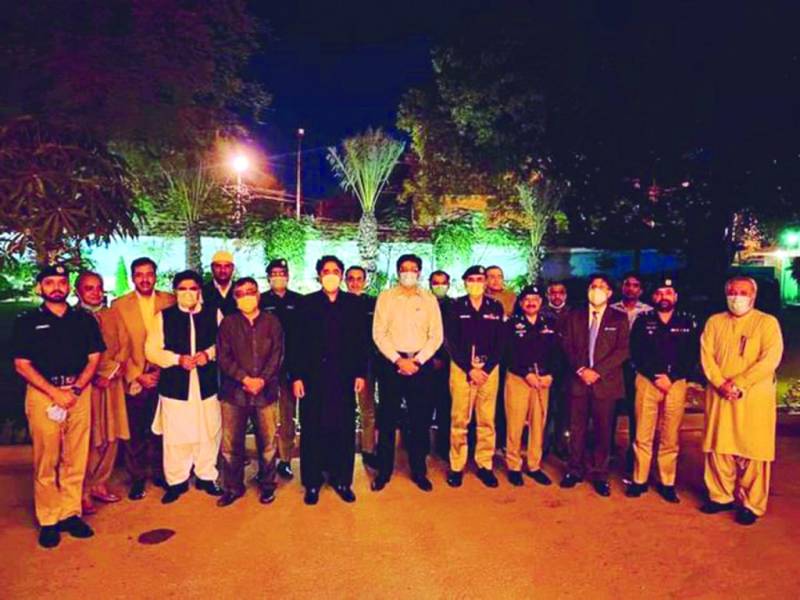
Last Tuesday, the army announced removal of unnamed officers of ISI and Rangers from their current unknown assignments and placement of their services at disposal of GHQ against unknown positions for “further departmental proceedings” for their involvement in the kidnapping of Sindh IG Police - grossly understated as the ‘Karachi incident.’
The action came as a result of an internal inquiry ordered by the army chief after Chairman PPP Bilawal Bhutto Zardari publicly demanded it. Earlier, all senior officers from IGP to down below to the level of DSPs and inspectors had applied en-masse for leave for long periods to protest the public humiliation of their chief. Responding to their protest, Bilawal announced to stand behind the Sindh police, asked the military to hold an inquiry and also ordered an inquiry by the provincial government.
Now that the internal inquiry findings have been made public, some important issues involved need to be examined closely.
First, the kidnapping of the head of an armed force by another armed force to make the former sign on a dotted line has been dismissed as ‘Karachi incident.’ The facts of the kidnapping of the IGP should not have been glossed over. There is incontrovertible evidence that the IGP was actually kidnapped and manhandled.
In the wee hours of Monday, October, 19 members of law enforcement agencies broke open the hotel room in Karachi in which Captain Safdar was staying with his wife Maryam Nawaz after the PDM power show that had ended hours before. Soon, it became known that Safdar had been arrested on the basis of orders which had been forcibly secured from the IGP after he was kidnapped from his official residence and taken to the office of a sector commander of another force.
The kidnapping and forcible signing of the arrest orders was not based on any heresy. Within hours, the IGP and other senior officers asked for en-masse long leaves. The leave application by Imran Yaqoob Minhas, Additional Inspector General Special Branch, immediately after the incident was most telling. Dated October 20, it said: “The recent episode of registration of FIR against Captain (r) Safdar, in which police high command has not just been ridiculed and mishandled but all ranks of Sindh police have been demoralized and shocked.” He added, “In order to come out of this shock and settle down I may kindly be granted 60 days leave.”
The grotesque fact of the kidnapping of an IGP has not been referred to even obliquely in the official press release. Not acknowledging the gravity of the crime and dismissing it as “Karachi incident” will not help in assuaging the hurt feelings. A first step in all reconciliation processes is to truthfully acknowledge the wrong done to the victim. That is why the stress is laid on ‘truth and reconciliation,’ and not merely on reconciliation.
It is reassuring that the ISPR press release acknowledges that the wrong doers belonged to the ISI and Rangers. But in doing so, it has also raised more questions than it has sought to answer.
As if to mitigate from the seriousness of the crime, the press release says that the ISI and Rangers personnel were “under increasing public pressure to ensure prompt action as per law” over the “desecration of the Mazar-i-Quaid.” It also went on to say that the response of the police to the lawlessness at the Mazar-i-Quaid was “slow and wanting.” As a result the “ISI/Rangers officers decided to act, rather over zealously.”
No one knows which section of the public went up to the ISI and Rangers personnel complaining that the police had failed to take prompt action as per law. All one knows is that the sole complainant against Captain Safdar was himself wanted by the police. And if indeed there were complaints, could the Rangers have acted on their own, bypassing the provincial government under whose orders it must act?
But the more serious question is: what does the ISI have to do with the functioning of police, or law and order? Is it the job of the ISI sector headquarters to monitor and take unilateral decisions that fall within the domain of police and provincial government?
That ISI officers indeed were involved has only strengthened the compelling narrative of state within state. This narrative has been in circulation ever since former Prime Minister Yousuf Raza Gilani first talked about it on the floor of the National Assembly. Gaining currency, it has since been tenaciously pursued by the tribal youth represented by the Pashtun Tahaffuz Movement (PTM). Lately, another former Prime Minister Mian Nazaw Sharif has also lent force to it. Now everyone in the country is complaining of it.
PPP Chairman Bilawal Bhutto Zardari has termed the inquiry report as a step towards fortifying “the prestige of the institutions.” As a meaningful first step towards fortifying prestige of institutions, the internal inquiry report should not be the end of the matter. To restore the prestige of the institutions, the conversation of ‘state within state’ needs to be carried forward meaningfully.
We need to make legislation determining the role and functions of ISI. It also needs to be probed more deeply whether junior officers driven by ‘overzealousness’ acted independent of the command. If that indeed is so, it would dangerously imply the existence of some sort of rogue elements at some level. No disciplined force can countenance such a possibility if they acted under command orders. The dragnet of inquiry and action must be further widened.
The writer is a former senator

The action came as a result of an internal inquiry ordered by the army chief after Chairman PPP Bilawal Bhutto Zardari publicly demanded it. Earlier, all senior officers from IGP to down below to the level of DSPs and inspectors had applied en-masse for leave for long periods to protest the public humiliation of their chief. Responding to their protest, Bilawal announced to stand behind the Sindh police, asked the military to hold an inquiry and also ordered an inquiry by the provincial government.
Now that the internal inquiry findings have been made public, some important issues involved need to be examined closely.
First, the kidnapping of the head of an armed force by another armed force to make the former sign on a dotted line has been dismissed as ‘Karachi incident.’ The facts of the kidnapping of the IGP should not have been glossed over. There is incontrovertible evidence that the IGP was actually kidnapped and manhandled.
In the wee hours of Monday, October, 19 members of law enforcement agencies broke open the hotel room in Karachi in which Captain Safdar was staying with his wife Maryam Nawaz after the PDM power show that had ended hours before. Soon, it became known that Safdar had been arrested on the basis of orders which had been forcibly secured from the IGP after he was kidnapped from his official residence and taken to the office of a sector commander of another force.
The kidnapping and forcible signing of the arrest orders was not based on any heresy. Within hours, the IGP and other senior officers asked for en-masse long leaves. The leave application by Imran Yaqoob Minhas, Additional Inspector General Special Branch, immediately after the incident was most telling. Dated October 20, it said: “The recent episode of registration of FIR against Captain (r) Safdar, in which police high command has not just been ridiculed and mishandled but all ranks of Sindh police have been demoralized and shocked.” He added, “In order to come out of this shock and settle down I may kindly be granted 60 days leave.”
The grotesque fact of the kidnapping of an IGP has not been referred to even obliquely in the official press release. Not acknowledging the gravity of the crime and dismissing it as “Karachi incident” will not help in assuaging the hurt feelings. A first step in all reconciliation processes is to truthfully acknowledge the wrong done to the victim. That is why the stress is laid on ‘truth and reconciliation,’ and not merely on reconciliation.
It also needs to be probed more deeply whether junior officers driven by ‘overzealousness’ acted independent of the command
It is reassuring that the ISPR press release acknowledges that the wrong doers belonged to the ISI and Rangers. But in doing so, it has also raised more questions than it has sought to answer.
As if to mitigate from the seriousness of the crime, the press release says that the ISI and Rangers personnel were “under increasing public pressure to ensure prompt action as per law” over the “desecration of the Mazar-i-Quaid.” It also went on to say that the response of the police to the lawlessness at the Mazar-i-Quaid was “slow and wanting.” As a result the “ISI/Rangers officers decided to act, rather over zealously.”
No one knows which section of the public went up to the ISI and Rangers personnel complaining that the police had failed to take prompt action as per law. All one knows is that the sole complainant against Captain Safdar was himself wanted by the police. And if indeed there were complaints, could the Rangers have acted on their own, bypassing the provincial government under whose orders it must act?
But the more serious question is: what does the ISI have to do with the functioning of police, or law and order? Is it the job of the ISI sector headquarters to monitor and take unilateral decisions that fall within the domain of police and provincial government?
That ISI officers indeed were involved has only strengthened the compelling narrative of state within state. This narrative has been in circulation ever since former Prime Minister Yousuf Raza Gilani first talked about it on the floor of the National Assembly. Gaining currency, it has since been tenaciously pursued by the tribal youth represented by the Pashtun Tahaffuz Movement (PTM). Lately, another former Prime Minister Mian Nazaw Sharif has also lent force to it. Now everyone in the country is complaining of it.
PPP Chairman Bilawal Bhutto Zardari has termed the inquiry report as a step towards fortifying “the prestige of the institutions.” As a meaningful first step towards fortifying prestige of institutions, the internal inquiry report should not be the end of the matter. To restore the prestige of the institutions, the conversation of ‘state within state’ needs to be carried forward meaningfully.
We need to make legislation determining the role and functions of ISI. It also needs to be probed more deeply whether junior officers driven by ‘overzealousness’ acted independent of the command. If that indeed is so, it would dangerously imply the existence of some sort of rogue elements at some level. No disciplined force can countenance such a possibility if they acted under command orders. The dragnet of inquiry and action must be further widened.
The writer is a former senator


